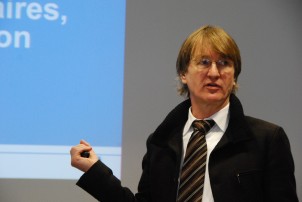I.Family partners deliver key messages at international conference
Research findings from the I.Family Study are being presented at an international conference on 15 March to help answer key questions about the childhood obesity epidemic, to support policies for teenage health and, ultimately, to help families across Europe make healthier lifestyle choices.
I.Family is an EC-funded project investigating the determinants of food choice, lifestyle and health in European families. With over 16,000 children involved at baseline, it has one of the largest European child cohorts. Leading partners are presenting at the ‘Power of Programming’ Conference in Munich (13th – 15th March) on their key findings.
The Conference will be attended by researchers and stakeholders from across Europe with an interest in infant nutrition and childhood obesity. I Family’s research will inform future thinking around the major problem of childhood obesity, including how nutrition in pregnancy and infancy impact on later health. Partners will also discuss the challenges of ensuring healthy lifestyle habits established in childhood continue into adolescence.
“The childhood obesity epidemic is of major global concern and nutrition practices in early infancy may play an important role,” says Professor Wolfgang Ahrens from the University of Bremen, Co-ordinator of the I.Family Study. He will present on ‘Pre- and perinatal influences on the weight status of primary school children’ together with Professor Alfonso Siani from the Institute of Food Sciences in Italy.
Professor Ahrens continues: “It has been suggested that the optimal time to prevent the development of weight gain and obesity in childhood is during pregnancy, along with feeding strategies during the first six months of life. A better understanding of these processes may provide opportunities for the prevention of obesity and improve public health.”
Professor Iris Pigeot from the Institute for Epidemiology and Prevention Research GmbH (Germany) will also present at the Conference with Professor Ahrens, on the expected future insights of the I.Family Study. I.Family is monitoring children initially enrolled in the EC-funded IDEFICS study (2006-2012) as they move into adolescence.
“Many factors at play today make it difficult to choose the lifestyles that will help maintain health and well-being,” Dr Pigeot explains. “Even if children have developed healthy eating and activity patterns, their lives change considerably as they become teenagers. Healthy routines can easily be lost and replaced by unhealthier habits, perhaps because of the influence of marketing or peer pressure.
“The I.Family study wants to unravel these factors and their complex interplay, to identify effective interventions and to support policy development, enabling more families to make healthier choices.”
In a subsequent presentation Dr Garrath Williams, I.Family partner from Lancaster University, UK, overseeing ethics, policy and stakeholder engagement, will address the responsibilities of scientists when conducting large-scale research into the sources and causes of epidemics, to ensure that their research has both relevance and impact.
“Scientists bear a responsibility to address issues of social significance,” explains Dr Williams. “But it is no simple matter to decide how to turn scientific findings into social or policy changes. This needs debate by many parties and we can’t assume that even quite clear research findings have straightforward implications for action or policy.”
ENDS/Contacts and Notes follow
Media contact for I.Family Study – Kate Viggers/Rhonda Smith +44 (0) 1264 326427/+44 (0) 7887 714957
Notes for Editors:
- The I.Family Study is an EC funded project under Framework 7 of the KBBE programme running from March 2012 to February 2017. It has 17 partners, working across 11 countries and with cohorts in 8 European countries – Germany, Italy, Sweden, Hungary, Cyprus, Estonia, Spain and Belgium.
- The study has two strategic objectives:
(1) Understand the interplay between barriers against and drivers towards healthy food choice;
(2) Develop and disseminate strategies to induce changes that promote healthy dietary behaviour in European consumers especially adolescents and their parents - The I.Family Study is re-assessing the families first engaged with the IDEFICS study when children were below 10 years of age now that they move into adolescence – the ‘tween’ years – identifying those families that have adopted a healthy approach to food and eating habits and those that have not. I. Family is adopting a holistic approach by also investigating the biological, behavioural, social and environmental factors that drive dietary behaviour as children journey towards adulthood.
4. I.Family study partners
| Participant organisation | Lead investigator(s) | Key responsibilities |
| University of Bremen, Germany | Wolfgang Ahrens | Project coordinator |
| BIPS – Institute for Epidemiology and Prevention Research GmbH, Germany | Iris Pigeot | German cohort, statistics |
| Institute of Food Sciences, National Research Council, Italy | Alfonso Siani | Italian cohort, nutritional epidemiology |
| Copenhagen Business School, Denmark | Lucia Reisch, Wencke Gwozdz |
Consumer behaviour & environmental influences |
| University of Lancaster, United Kingdom | Garrath Williams | Ethics, policy, and stakeholder engagement |
| Sahlgrenska Academy at the University of Gothenburg, Sweden | Staffan Mårild, Lauren Lissner |
Swedish cohort, family analysis |
| University of Helsinki, Finland | Jaakko Kaprio | Familial aggregation & genetic modelling |
| University of the Baleares Islands, Spain | Andreu Palou, Catalina Picó |
Genomic analysis |
| University of Pécs, Hungary | Dénes Molnár | Hungarian cohort |
| Rudolf Magnus Institute of Neuroscience, The Netherlands | Roger Adan | Neuroimaging & neuropsychology |
| Research and Education Institute of Child Health, Cyprus | Michael Tornaritis | Cypriot cohort |
| National Institute for Health Development, Estonia | Toomas Veidebaum | Estonian cohort |
| Fondazione IRCCS Istituto Nazionale Tumori, Italy | Vittorio Krogh | Dietary assessment methods |
| University of Bristol, United Kingdom | Angie Page, Ashley Cooper |
Physical activity monitoring |
| Minerva PRC Ltd, United Kingdom | Rhonda Smith, Marc Catchpole |
Dissemination and communication |
| University of Zaragoza, Spain | Luis Moreno | Spanish cohort |
| Ghent University, Belgium | Stefaan De Henauw | Belgian cohort |
Notes/End
140311-IF-PR7-Munich







